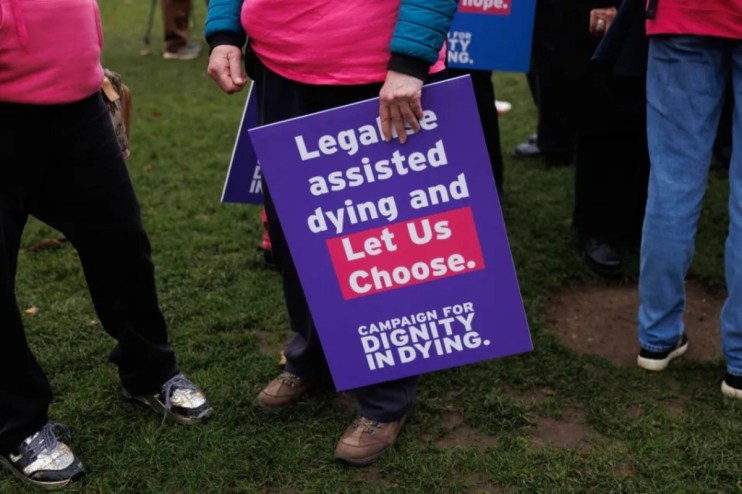| Updated:

Assisted dying is about the “human cost” and not pounds and pence, the MP behind the proposed legislation has said after an assessment of the potential costs.
An impact assessment into the Terminally Ill Adults (End of Life) Bill was published on Friday, exactly a fortnight ahead of the next Commons debate on the proposed new law.
It set out estimates for how many people might apply and go on to have an assisted death, as well as potential costs of the service and reduced end-of-life care costs.
“It’s a very uneasy sort of conversation to have,” Kim Leadbeater, the Labour MP behind the Bill, told BBC Radio 4’s Today programme.
“Because for me, assisted dying and giving people the choice at the end of their life when they’re facing a terminal illness is about the human cost. It’s not about pounds and pence.”
She said the the Bill provided the “most robust piece of legislation in this area in the world”.
“And that does come with a cost of setting it up, but also we know that there would be savings associated with having this model in place as well.”
The assessment estimated that assisted dying could cut end-of-life care costs by as much as an estimated £10 million in the first year and almost £60 million after 10 years.
It noted that reducing those costs “is not stated as an objective of the policy” but some have expressed concerns that this could put pressure on people to end their lives.
MPs will next debate assisted dying on May 16
Katherine Sleeman, a palliative care professor at King’s College, said the numbers are not a “precise prediction” of what will happen.
“Of course, legalisation of assisted dying could lead to cost savings … because costs of care in the last months of life in particular are very, very high.
“And obviously, if someone isn’t living those last months of life, then costs will be lower.
“But in terms of the precise figures, I think we just need to be aware that they are estimates and come with a range around them,” she told Today.
Dr Gordon Macdonald, chief executive of Care Not Killing – which is opposed to a change in the law, said the document “confirms that changing the law will save money… exactly as we have seen in other jurisdictions which have introduced state assisted killing, placing pressure on vulnerable terminally ill people to end their lives”.
Bishop of London Dame Sarah Mullally said it was “chilling reading” and said any change in the law that puts the vulnerable at risk rather than working to improve access to palliative care must be opposed.
She said: “It is crude to see these cost savings set out in this way, and it is easy to see how numbers of this nature could contribute to someone feeling that they should pursue an assisted death rather than receive care.
“Each human life is immeasurably more valuable than the money that may be saved through their premature death.”
Ms Leadbeater said those behind the Bill are “checking for coercion at every level of this process”.
The Bill has undergone significant changes since it succeeded in an initial vote in the Commons in November.
The High Court safeguard has been dropped and replaced by expert panels, while the implementation period has been doubled to a maximum of four years for an assisted dying service to be in place, should the Bill pass into law.
The proposed legislation would allow terminally ill adults in England and Wales, with fewer than six months to live, to apply for an assisted death, subject to approval by two doctors and a panel featuring a social worker, senior legal figure and psychiatrist.
The impact assessment said the total number of assisted deaths is estimated to range from between 164 and 787 in the first year of the service to between 1,042 and 4,559 in year 10.
The establishment of a Voluntary Assisted Dying Commissioner and three-member expert panels would cost an estimated average of between £10.9 million to £13.6 million per year, the document said.
But it said it had “not been possible” to estimate the overall implementation costs at this stage of the process, which could include IT, recruitment and training and could begin to kick in within 12 months of the Bill getting Royal Assent.
MPs will gather for debate on May 16 in the House of Commons for the Bill’s report stage, during which members are expected to vote on further amendments.
If time allows on that date, MPs could also vote on whether to approve the Bill at third reading – its final stage in the Commons – and decide if it is then sent to the House of Lords for further scrutiny.
Voting is according to conscience, so MPs do not vote along party lines, and the Government has said it is remaining neutral as a whole.
Health Secretary Wes Streeting, who confirmed last month that he still plans to oppose the Bill at the next vote, said last year that there were “choices and trade-offs”, adding “any new service comes at the expense of other competing pressures and priorities”.
It has been suggested some MPs who supported the Bill last year could change their stance when it returns for a further vote, after the change to the High Court safeguard.
Ms Leadbeater did not concede that support for her Bill was cooling.
“I’m actually having conversations with colleagues who voted against at second reading, and are now considering the new legislation that they’ll be presented, and thinking about potentially voting for this because of the additional safeguards that have been added.
“But it’s absolutely right that all colleagues are taking this extremely seriously.”
By Helen Corbett and Aine Fox, PA